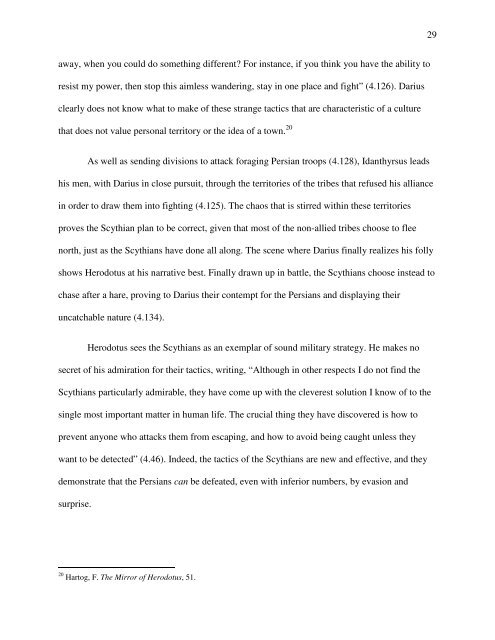The Old and the Restless - The Egyptians and the Scythians in Herodotus' Histories by Robert J. Hagan
Create successful ePaper yourself
Turn your PDF publications into a flip-book with our unique Google optimized e-Paper software.
29<br />
away, when you could do someth<strong>in</strong>g different? For <strong>in</strong>stance, if you th<strong>in</strong>k you have <strong>the</strong> ability to<br />
resist my power, <strong>the</strong>n stop this aimless w<strong>and</strong>er<strong>in</strong>g, stay <strong>in</strong> one place <strong>and</strong> fight” (4.126). Darius<br />
clearly does not know what to make of <strong>the</strong>se strange tactics that are characteristic of a culture<br />
that does not value personal territory or <strong>the</strong> idea of a town. 20<br />
As well as send<strong>in</strong>g divisions to attack forag<strong>in</strong>g Persian troops (4.128), Idanthyrsus leads<br />
his men, with Darius <strong>in</strong> close pursuit, through <strong>the</strong> territories of <strong>the</strong> tribes that refused his alliance<br />
<strong>in</strong> order to draw <strong>the</strong>m <strong>in</strong>to fight<strong>in</strong>g (4.125). <strong>The</strong> chaos that is stirred with<strong>in</strong> <strong>the</strong>se territories<br />
proves <strong>the</strong> Scythian plan to be correct, given that most of <strong>the</strong> non-allied tribes choose to flee<br />
north, just as <strong>the</strong> <strong>Scythians</strong> have done all along. <strong>The</strong> scene where Darius f<strong>in</strong>ally realizes his folly<br />
shows Herodotus at his narrative best. F<strong>in</strong>ally drawn up <strong>in</strong> battle, <strong>the</strong> <strong>Scythians</strong> choose <strong>in</strong>stead to<br />
chase after a hare, prov<strong>in</strong>g to Darius <strong>the</strong>ir contempt for <strong>the</strong> Persians <strong>and</strong> display<strong>in</strong>g <strong>the</strong>ir<br />
uncatchable nature (4.134).<br />
Herodotus sees <strong>the</strong> <strong>Scythians</strong> as an exemplar of sound military strategy. He makes no<br />
secret of his admiration for <strong>the</strong>ir tactics, writ<strong>in</strong>g, “Although <strong>in</strong> o<strong>the</strong>r respects I do not f<strong>in</strong>d <strong>the</strong><br />
<strong>Scythians</strong> particularly admirable, <strong>the</strong>y have come up with <strong>the</strong> cleverest solution I know of to <strong>the</strong><br />
s<strong>in</strong>gle most important matter <strong>in</strong> human life. <strong>The</strong> crucial th<strong>in</strong>g <strong>the</strong>y have discovered is how to<br />
prevent anyone who attacks <strong>the</strong>m from escap<strong>in</strong>g, <strong>and</strong> how to avoid be<strong>in</strong>g caught unless <strong>the</strong>y<br />
want to be detected” (4.46). Indeed, <strong>the</strong> tactics of <strong>the</strong> <strong>Scythians</strong> are new <strong>and</strong> effective, <strong>and</strong> <strong>the</strong>y<br />
demonstrate that <strong>the</strong> Persians can be defeated, even with <strong>in</strong>ferior numbers, <strong>by</strong> evasion <strong>and</strong><br />
surprise.<br />
20 Hartog, F. <strong>The</strong> Mirror of Herodotus, 51.
















